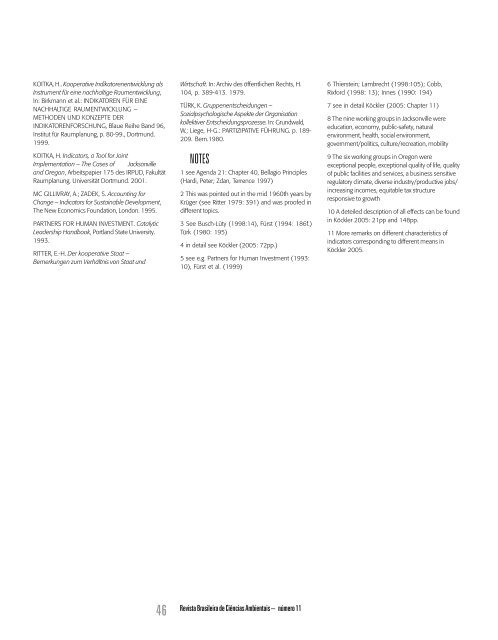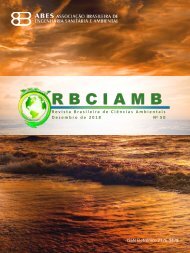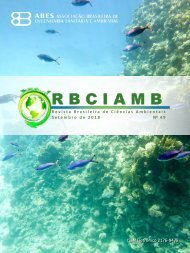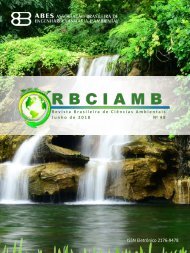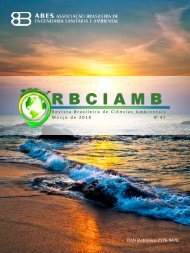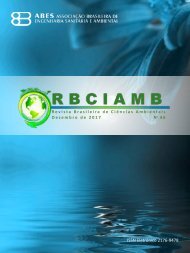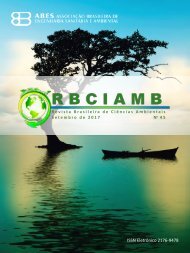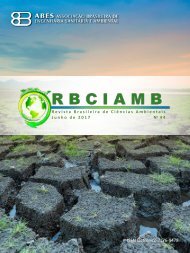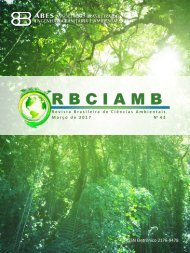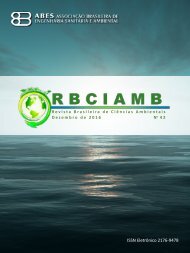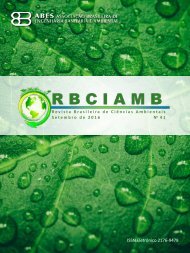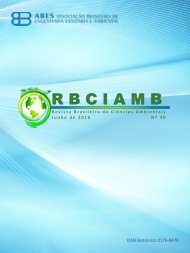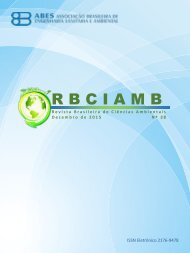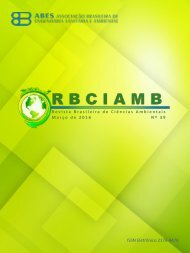EDIÇÃO 11 - Dezembro/08 - RBCIAMB
A Revista Brasileira de Ciências Ambientais – RBCIAMB - publica artigos completos de trabalhos científicos originais ou trabalhos de revisão com relevância para a área de Ciências Ambientais. A RBCIAMB prioriza artigos com perspectiva interdisciplinar. O foco central da revista é a discussão de problemáticas que se inscrevam na relação sociedade e natureza em sentido amplo, envolvendo aspectos ambientais em processos de desenvolvimento, tecnologias e conservação. A submissão dos trabalhos é de fluxo contínuo.
A Revista Brasileira de Ciências Ambientais – RBCIAMB - publica artigos completos de trabalhos científicos originais ou trabalhos de revisão com relevância para a área de Ciências Ambientais. A RBCIAMB prioriza artigos com perspectiva interdisciplinar. O foco central da revista é a discussão de problemáticas que se inscrevam na relação sociedade e natureza em sentido amplo, envolvendo aspectos ambientais em processos de desenvolvimento, tecnologias e conservação. A submissão dos trabalhos é de fluxo contínuo.
Create successful ePaper yourself
Turn your PDF publications into a flip-book with our unique Google optimized e-Paper software.
KOITKA, H.. Kooperative Indikatorenentwicklung alsInstrument für eine nachhaltige Raumentwicklung,In: Birkmann et al.: INDIKATOREN FÜR EINENACHHALTIGE RAUMENTWICKLUNG –METHODEN UND KONZEPTE DERINDIKATORENFORSCHUNG, Blaue Reihe Band 96,Institut für Raumplanung, p. 80-99., Dortmund.1999.KOITKA, H. Indicators, a Tool for JointImplementation – The Cases of Jacksonvilleand Oregon, Arbeitspapier 175 des IRPUD, FakultätRaumplanung, Universität Dortmund. 2001.MC GILLIVRAY, A.; ZADEK, S. Accounting forChange – Indicators for Sustainable Development,The New Economics Foundation, London. 1995.PARTNERS FOR HUMAN INVESTMENT. CatalyticLeadership Handbook, Portland State University.1993.RITTER, E.-H. Der kooperative Staat –Bemerkungen zum Verhältnis von Staat undWirtschaft. In: Archiv des öffentlichen Rechts, H.104, p. 389-413. 1979.TÜRK, K. Gruppenentscheidungen –Sozialpsychologische Aspekte der Organisationkollektiver Entscheidungsprozesse. In: Grundwald,W.; Liege, H-G.: PARTIZIPATIVE FÜHRUNG. p. 189-209. Bern.1980.NOTES1 see Agenda 21: Chapter 40, Bellagio Principles(Hardi, Peter; Zdan, Terrence 1997)2 This was pointed out in the mid 1960th years byKrüger (see Ritter 1979: 391) and was proofed indifferent topics.3 See Busch-Lüty (1998:14), Fürst (1994: 186f.)Türk (1980: 195)4 in detail see Köckler (2005: 72pp.)5 see e.g. Partners for Human Investment (1993:10), Fürst et al. (1999)6 Thierstein; Lambrecht (1998:105); Cobb,Rixford (1998: 13); Innes (1990: 194)7 see in detail Köckler (2005: Chapter <strong>11</strong>)8 The nine working groups in Jacksonville wereeducation, economy, public-safety, naturalenvironment, health, social environment,government/politics, culture/recreation, mobility9 The six working groups in Oregon wereexceptional people, exceptional quality of life, qualityof public facilities and services, a business sensitiveregulatory climate, diverse industry/productive jobs/increasing incomes, equitable tax structureresponsive to growth10 A deteiled description of all effects can be foundin Köckler 2005: 21pp and 148pp.<strong>11</strong> More remarks on different characteristics ofindicators corresponding to different means inKöckler 2005.46Revista Brasileira de Ciências Ambientais – número <strong>11</strong>


